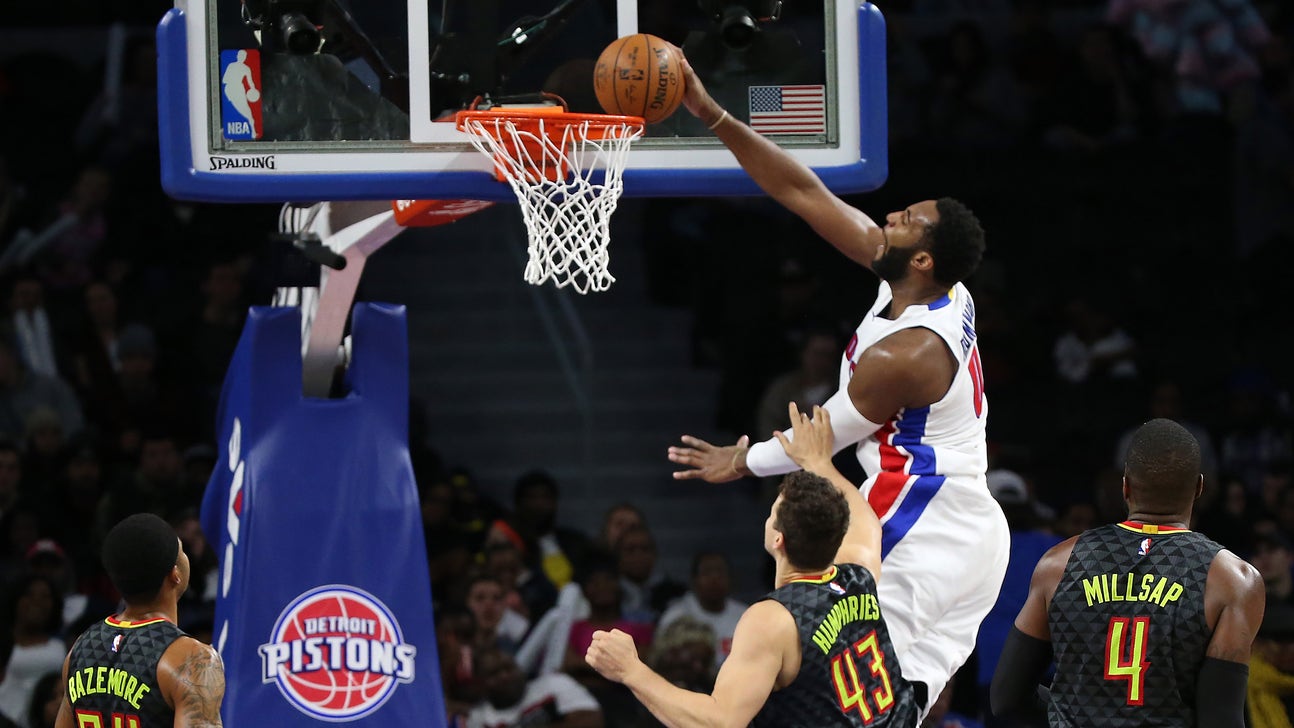
The ugly truth behind Andre Drummond's effect on the Pistons offense
Plenty has been made of Andre Drummond’s defensive shortcomings for the Detroit Pistons, but it’s time to peel back the layers on what he brings on offense.
Andre Drummond has long been an enigma for the Detroit Pistons. He was drafted as little more than a project by Joe Dumars in his second-to-last draft, and he accelerated on his learning curve to the point that by his second season he was considered a superstar in the making. While he has improved elements of his game almost every season since entering the league, it may be too soon to proclaim him any such thing, and he may have capped his own potential.
Plenty has been said about Drummond’s defense, such as it is. It’s known by now that while he should have the tools to be a good rim defender, he simply isn’t that. Whether it be footwork, positioning, effort, interest level or what have you, the total package hasn’t come together to construct the elite defender his size and athletic ability suggests he should eventually (and probably already) be.
His defensive rating is high, a fairly staggering 111 points per 100 possessions. That number is far too high for comfort, but for further explanation of why that number is so high, go read this piece about the Pistons’ discrepancy between three-point shots allowed and three-point field goal percentage allowed. In a nutshell, the Pistons opponents are hitting threes at a wildly disproportionate and likely unsustainable rate when Drummond and the starters are on the floor. If opponent threes were hitting at a league-average rate, Drummond’s defensive rating would be about 5.5 points per 100 possessions lower. That’s bad luck, it has very little to do with Drummond either way, and we’re not here to talk about bad luck or perimeter defense.
No, what we’re here to talk about is much more damning. What we’re here to talk about is the Pistons’ offense and the crippling effect Andre Drummond has on that offense.
The narrative this season has been that Drummond has regressed, that his production has taken a quantum leap backward since last season. The truth is that he has more or less retained the same level of production year over year, with the caveat that his numbers are affected by playing a bit more than two minutes per game less than last season. In fact, he’s posting career highs in defensive rebounding percentage and total rebounding percentage, both of which are categories in which he led the NBA a season ago.
He’s also posting a true shooting percentage higher than his breakout season a year ago. Not only that, but he’s posting a career-high free throw percentage. It’s only 43.1 percent, but it’s better than last season’s unfathomable 35.5 percent, and it’s good enough to keep opposing coaches from hacking him and rendering him unplayable late in games, right?
The answer to this question is problematic for the Pistons at best, and in order to address it we’re going to have to look at Drummond’s post ups and the deleterious effect they have on the offense as a whole. We’ll come back to the free throws, why opposing coaches have stopped hacking Drummond except in the most dire straits, and why that’s actually a really bad thing for the Detroit Pistons.
As for Drummond’s post ups, there is a belief among Pistons fans that while he’s not highly efficient from the post, he’s getting better little by little and season by season and it’s worth the lost possessions to get him touches. This belief is completely incorrect.
In fact, while his efficiency has not increased, his touches in the post have increased on a year-by-year basis. In 2014-15, Drummond scored .689 points per possession on 4.94 possessions per 36 minutes. In 2015-16, he scored .726 points per possession on 5.37 possessions per 36 minutes, and this season he is scoring just .711 points per possession on 5.84 possessions per 36 minutes.
There is a fundamental flaw when it comes to featuring big men in the post. Call it Shaq Syndrome if you will. Shaquille O’Neal was awesome in the post when he played at the height of his powers, and now he has a job where he talks on TV and makes fun of big men who don’t post up. Shaq has helped shape the trajectory of Dwight Howard‘s career by pressuring him to post up from a TV studio in Atlanta.
The thing is, the big man post up is largely an artifact from a bygone era. The post up is best used when you can get mismatches, and that’s best achieved by moving the ball and getting athletic wings posting up on players who can’t match up down low. Big man on big man offense isn’t how you get production from the post anymore, especially when the big man in question struggles to get good shots from deep position.
The Pistons rarely get such mismatches, because the Pistons don’t move the ball. In fact, they’re one of the most infrequent passing teams in the NBA. The Pistons are 18th in the NBA in assist ratio, they’re 18th in passes made, they’re 26th in secondary assists and 26th in potential assists. This means the only way to get Drummond mismatches is to run the pick and roll for him.
It’s concerning that Drummond spent his summer working on his post game to no apparent avail, and his free throw shooting to very little avail. In fact, his 7.6 point increase from the free throw line versus last year is very likely nothing but statistical noise.
Things get a little uglier here.
More from PistonPowered
Drummond is actually a more efficient scorer from the free throw line than he is from the post. I’m going to pause for a minute and let that sink in before we continue. To prove this, we take his free throw percentage this season of 43.1 percent. If we assume that ALL of his trips to the free throw line are two shots, he’s scoring .862 points per possession where he goes to the line. Mind you, some trips to the line will be and-ones, meaning that while .862 points per possession is the absolute most he can be producing from the line, his actual production is somewhere less than that.
Again, Drummond has never scored more than .726 points per possession from the post, which is a mark dramatically lower than the absolute ceiling of his free throw production.
Still, it’s only a few possessions per game in which the Detroit Pistons humor their star big man and throw him a bone, right? How bad of an impact can that possibly have?
The Pistons score 91.2 points per 100 possessions in the halfcourt. If we remove all Drummond post up possessions and points scored from the Pistons’ halfcourt numbers, the Pistons score 92.1 points per 100 possessions. Drummond’s post ups cost the Pistons almost a full point per 100, and this is not a team that can afford to be sacrificing points.
There’s a very good reason opposing coaches don’t hack Drummond except for at the most desperate of circumstances. That reason is that Drummond’s free throw shooting is not so much less efficient than the Detroit Pistons halfcourt offense that opposing teams are willing to waste fouls and put the Pistons in the penalty earlier than necessary. After all, it’s a simple adjustment for the Pistons to take Drummond out (and the Pistons score almost three points per 100 possessions more with Drummond on the bench than they do when he’s on the floor) and now the Pistons have five guys ready to take free throws if they get fouled.
Teams aren’t fouling Andre Drummond because he’s improved enough that it’s unwise for them to put him on the line, they’re not fouling because the Pistons offense is so ineffective with him on the floor that it’s actually a higher expectation strategy for opponents to simply let them play on.
It’s important to remember that Andre Drummond is a very good player with value in this league, but given these significant limitations on what he can bring to an offense (without elite defensive skills to offset), it’s clear to see that Drummond’s best suited role is not that of the best player on a good team, let alone best player on a contender. The Detroit Pistons have placed themselves in a corner when Drummond is their keystone, their building block, but he shouldn’t be the guy to play that role for this team.
It might be time to ask some very real questions about Drummond’s role on this team and the overall identity and plan the Detroit Pistons have going forward.
